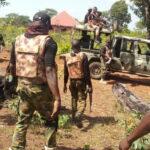On January 14, last year, a daring attack on the motorcade of the Emir of Potiskum, Alhaji Umaru Bubaram, around Jaji, along the Kaduna-Zaria Highway, sent shockwaves.
Though Kaduna was by then taking a prominent spot in the country’s insecurity map, that particular part of the state was not known to be infested by the rampaging armed men.
- Buhari orders flag to fly at half-mast, declares holiday for armed forces
- 7 Lessons from Algeria in fight against bandits and terrorists
At least six persons were reported killed in that attack and many others were reportedly abducted. Shockingly, a statement of claim came from the Jama’atu Ansarul Muslimina Fi Biladis Sudan, better known as Ansaru, a Boko Haram splinter group which had hibernated for years.
Prior to that attack, Ansaru, which broke away from Boko Haram in early 2012 had hibernated, operating largely underground in sleeper cells, following disbandment of its nucleus in Okene, Kogi State.
Though Ansaru had had presence in some places in the North West, the group is not known to be active in the region, beyond incidences of kidnap-for-ransom, targeting largely expatriates.
Investigation by Daily Trust revealed that there are at least three active Islamic insurgent groups operating in banditry-ravaged states of Kaduna, Zamfara and Niger.
Aside Ansaru, three other terror groups are struggling for space within the expanse of land covering these three states, and elsewhere.
Ansaru’s presence, according to sources, is mostly around Igabi, Giwa and Birnin Gwari local government arears of Kaduna State.
In Niger State, a group, Darul Islam, is co-habiting with bandits in a quest to establish presence in Niger vast forests around Shiroro and Kagara.
The two terror groups based in the North-East; the Abubakar Shekau-led Jama’atu Ahlil Sunna Lid Da’awatu wal Jihad and the Islamic State in West Africa Province (ISWAP) are said to be in active moves with the aim of benefitting from the chaos created by bandits in the worse-hit states.
A recent report by the International Crisis Group (ICG) pointed out that since late 2019, ISWAP and Ansaru have started taking credit for attacks in the North-West. In October last year, according to the report, ISWAP claimed responsibility for an attack on Nigerian troops in Sokoto.
ICG said, “Many Nigerian security and other independent local sources interviewed by Crisis Group corroborate that amid the breakdown of stability in Zamfara and elsewhere, two Boko Haram offshoots are making inroads into the region, where they are forging tighter relationships with aggrieved communities, herder-affiliated armed groups and criminal gangs.”
Some sources close to key Fulani leadership of Fulani bandits, however, insisted that the rural bandits operate independent of the religious terror groups.
“Like with all neighbourliness, they sometimes relate well and support each other, while at some other times they quarrel and clash,” one source said.
Last year, a senior security source told Daily Trust that some bandits and insurgent elements around Birnin Gwari had collaborated to host a telecommunication tower in one of the rocky formations in the forests to aid communication with the outside world.
Ansaru in Kaduna
Ansaru, populated mostly by Hausa-speaking zealots and others from Kogi State, has allegiance to al-Qaeda in the Islamic Magreb (AQIM). When it broke away from Shekau’s Boko Haram in 2012, it cited the group’s indiscriminate killing of civilians as its major grouse. Ansaru, at the time, advocated for retaliation of killing of Muslims in North Central states, among other demands on its members. The group was dislodged from its camps in Kogi State in 2016 where its leader, Khalid al-Barnawi, was also arrested in April of that year. It is now staging a comeback, taking advantage of the ungoverned spaces and chaos in the North West.
According to the ICR’s report, Ansaru, which has a long history of operating in the North West, where it engaged in the high-profile kidnapping of expatriate engineers between 2012 and 2013, is forging new relationships with other smaller radical groups in Zamfara State, particularly in the areas around Munhaye, Tsafe, Zurmi, Shinkafi and Kaura Namoda.
ICR noted that, “The group has also deployed clerics to discredit democratic rule and the state government’s peace effort, a ‘hearts and minds’ campaign aimed at winning support from rural communities. It is also wooing some of the armed groups to its ranks, including by offering or selling them AK-47 rifles supplied by its allies in the al-Qaeda-linked Jama’at Nusrat al-Islam wal-Muslimin (JNIM), at lower than the prevailing market price. Security officials say it has been recruiting members, and that it previously sent some recruits to Libya for combat training.”
Emerging figurehead for Ansaru’s operation in Kaduna’s Kuduru Forest is a certain Mallam Abba who locals said commands an army of young armed men and rules over a large area under strict Islamic code. A security source, however, informed Daily Trust that Mallam Abba, who previously escaped arrest and fled to Kano, has been arrested by security forces.
Darul Islam
Out of Niger State is the up and coming insurgency group, Darul Islam. Though the group is not new, its recluse and largely non-violent past made it inconspicuous. However, credible sources said the group, which members are also found in Toto Local Government Area in Nasarawa State, is arming itself to achieve its territorial ambition.
In August, 2009, police sacked about 4,000 members of the Darul Islam sect, who had established a community governed strictly under their understanding of the Islamic law, around Mokwa in Niger State. The police at the time said among 600 of its members profiled were persons from places as far as Chad, Cameroon and Niger Republic.
The Niger State Government at the time returned members of the sect to their states of origin. But with no strict follow up and rehabilitation, the sect members melted into the society, regrouping in smaller units at different places. Most of the displaced sect’s members are said to have regrouped in Nasarawa and Niger states with those in Niger living side-by-side with bandit groups around the state’s boundary with Kaduna.
In late March, bandits operating in areas close to the Darul Islam camps in Niger State had a clash with the sect’s members. Daily Trust could not however establish the cause and the extent of the clash.
Boko Haram & ISWAP
Buoyed by the availability of space and the confusion created by the unruly activities of banditry, as well as the desire to divert attention of security forces’ concentration on their bases in Borno and Yobe states, both Shekau’s Boko Haram and ISWAP have actively sought space to establish their presence in the North West and some parts of the North Central.
Two inter-connected events brought to the fore the existence of Boko Haram cells, or at least its armed collaborators in the banditry-ravaged states. On July 7, last year, Boko Haram released a video of eid festival by an armed group from Niger State in which speakers extended greetings to Shekau, who they described as “leader”, and also “brothers in Zamfara”. This video was some sort of a reply to an earlier public epistle from Boko Haram fighters in the North East who in a similar message greeted fellow fighters in Zamfara and Niger states.
While no publicly recorded presence of Boko Haram is established in Zamfara, locals and security sources told Daily Trust that fighters from the group are working hard for presence in the state.
In December, while the country was still wondering the whereabouts of over 300 students abducted from a school in Kankara in Katsina State, a video emerged from Boko Haram laying claim to the abduction.
But in an interview with Daily Trust in February, the late bandit leader, Auwal Daudawa, who masterminded the students’ abduction denied linkage with Boko Haram, saying he was not aware how they came about the video.
In its report, Crisis Group said ISWAP, which has been developing cells in much of Northern Nigeria, is also building capacity of several smaller radical groups in the North West, particularly by offering livelihood support, including monthly stipends, to some of their members.
A local civil society representative told Crisis Group: “ISWAP is now the model for these smaller groups.” Some of the smaller groups, according to the report, are based in Magaba on the border with Niger Republic, and others around Dankwo and Derin-Deji, in the Zuru area of Kebbi State.
“In keeping with the methods used in the North East prior to Boko Haram’s emergence a decade ago, ISWAP is also encouraging clerics who are particularly critical of corruption and democracy, a message that resonates strongly in impoverished communities,” Crisis Group reports.
“Some military and government sources in Abuja point to evidence of transactional relationships between ISWAP and other armed groups in Nigeria’s North West. In 2019, a senior government source in Abuja told Crisis Group that security forces had intercepted communications showing delivery of ammunition from Boko Haram or ISWAP to a ‘bandit’ group. Military sources also say some of the rifles captured in encounters with some herder-allied armed groups either bore inscriptions from, or were the same models used by Cameroon’s Rapid Intervention Battalion. That suggests the rifles may have been confiscated from Cameroonian soldiers by jihadist groups operating in the Lake Chad area, where Nigerian and Cameroonian forces cooperate to combat the offshoots of Boko Haram,” part of the report reads.
Why insurgents are taking base – Retired general
A retired Brigadier General, Sani Kukasheka Usman, said the moves to establish presence by insurgents in states ravaged by banditry is a manifestation of the groups’ unrelenting posture to perpetuate themselves.
He said proliferation of small arms and light weapons has exacerbated insecurity across the country, giving rise to multiple armed groups.
The former army spokesperson, who was for years involved in the military’s battle against Boko Haram, said at various times state governments were alerted on the presence of insurgents’ camps in their states but most of them brushed the intelligence aside, preferring to pretend all was well.
“The governors often want quick fixes or throw money as a way of addressing the problem,” he said, explaining that the issues are more deeply seated and require a more holistic approach in tackling them then the knee-jerk approach some political leaders want.
Usman further attributed the situation in the affected states and the larger country to the gap between government at all levels and the people, leading to concealing of information that can help troops to defeat armed groups.

 Join Daily Trust WhatsApp Community For Quick Access To News and Happenings Around You.
Join Daily Trust WhatsApp Community For Quick Access To News and Happenings Around You.


